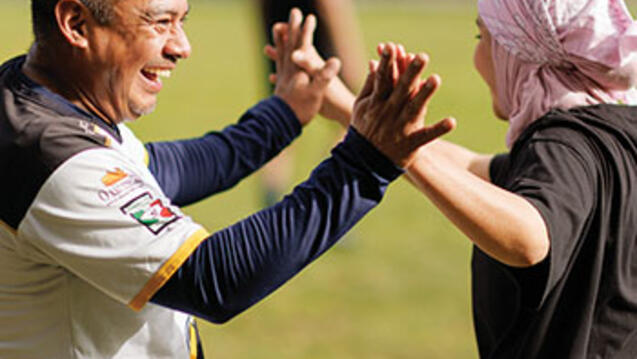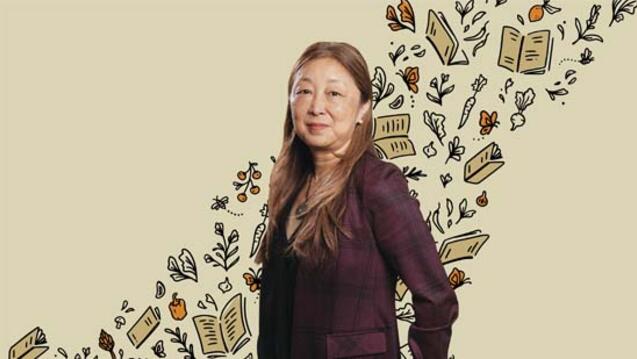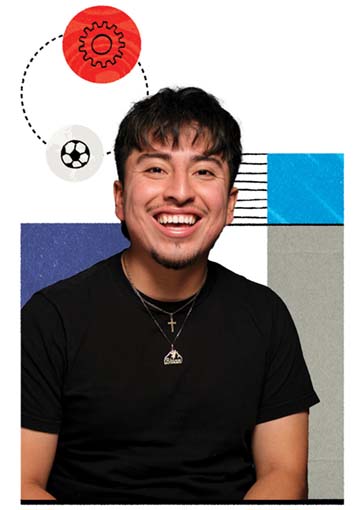
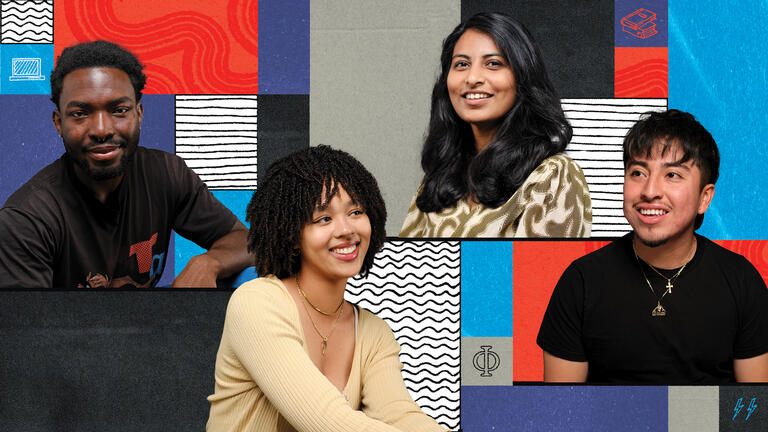
177 Million Ways to Change the World
In this academic year, USF awarded $177 million in scholarships and grants to more than 7,000 undergraduate, graduate, and law students. USF alumni and friends have supported more than 550 scholarship funds since 2020.
“Every gift, no matter the size, helps give students access to a distinguished Jesuit education,” says Eileen Fung, provost and vice president of academic affairs. “We not only equip students to succeed in their chosen careers; we inspire them to explore, engage, and improve the world.” Here, four scholarship recipients tell their stories.

Deven Perez '25
Read Scholar
When I got accepted at USF, I didn’t know if I’d be able to go. Even with the financial aid package, college was a big stretch. But I told my family, I’ll just go for a year or two. I won’t graduate but at least I’ll go. I wanted to go to USF. I love the diversity. I wanted to study engineering. So I went.
But then, my first year at USF, just a week in, I got an email telling me I’d been awarded a Read Scholarship for four years. I was kind of skeptical. I’d never heard of the Read Scholarship. But then I got a call. They told me it’s true: Peter Read gives scholarships to USF students from the Bay Area, mostly from low-income families and mostly first-generation college students. It’s not something you apply for; they identify you.
That scholarship changed my life. Seriously. I got to cut back my work hours. I could focus more on my studies. I joined extracurricular activities and clubs. I play on the club soccer team. The scholarship is a blessing. And it’s inspiring. I’ve met with Peter Read. Not just me but the other scholarship recipients. We’ve met for luncheons and dinners. Peter Read gives back. That’s what I want to do. My father’s an immigrant. He didn’t go to college. He’s a welder. I’m at college now, studying electrical engineering. I want to start my own welding business. I want to hire immigrants, give them opportunities.
The Read Scholarship, established by Peter Read ’67, supports students from underrepresented communities in the Bay Area.
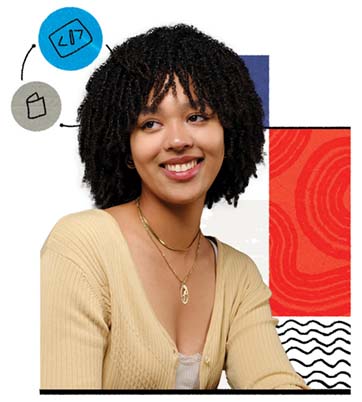
Athene Emeli Marston ’25
Caufield Family Renaissance Scholar
I started at USF as a computer science major, but every chance I got, I took philosophy classes. I love philosophy. For me, it’s pure passion.
So one day in my sophomore year Professor [Thomas] Cavanaugh said to me, “You know, if you’re going to take classes in philosophy, you should minor in philosophy.” I said, OK! Eventually people started saying, “You know, if you’re going to take a lot of classes in philosophy, you should major in philosophy.” I said, Why not? So now I’m a double major, in computer science and in philosophy.
For me, philosophy is mentally stimulating. It makes me think in new ways. At USF, classes are small. We have a lot of discussion. We challenge each other. I love everything about it.
Last year the Honors College sent me an email and invited me to apply for the Caufield Scholarship. I applied, and I got it. It made me and my family happy. It helps me pay for school! But it’s more than that. It’s encouraging to be recognized for having a STEM major and a humanities major. The two might seem very different but actually there’s a lot of overlap.
Last semester I took Formal Logic with Professor [Nick] Leonard. Formal logic is the basis of computer science. Computer science is all about logic and reasoning: Starting with what we know, let’s step into the unknown. Let’s make a hypothesis. Let’s solve this problem. We just happen to be working with computers instead of papyrus or clay tablets. And now, with the rise of artificial intelligence, we’ve seen a rise in AI ethicists. That’s a job now: People get paid to explore the moral dimensions and moral implications of AI. When I started at USF I didn’t know what I wanted to do. I’m still not sure what I want to do. But I’m certain that I want to use philosophy wherever my future might take me — in tech or beyond.
The Caufield Family Renaissance Scholarship, established by English major and entrepreneur Frank Caufield ’90, supports global citizens who have disparate majors and minors.
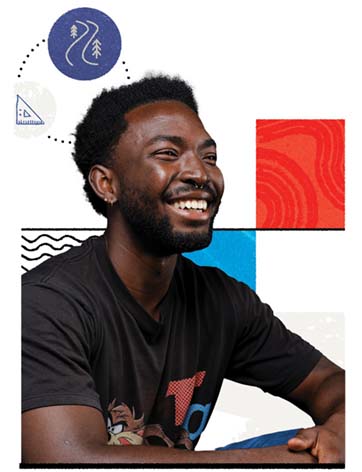
Richard Dzreke ’25
Community Leadership Scholar
I’m a computer science major, math minor. Last year I applied for the Community Leadership Scholarship and I got it. I was part of a cohort of about 10 students who also got the scholarship. We volunteered at different nonprofits and community organizations. Most of us joined one program and stuck with it for the school year. But for me, since my schedule was so busy being a resident assistant and working part-time, I got permission to join Hands On Bay Area, a local nonprofit that connects people to a whole range of volunteer projects.
Through Hands On, I helped build trails in Golden Gate Park, helped with planting and weeding and shoveling at the Florence Fang Community Farm in Bayview, and helped bag groceries at Mercy Food Pantry in Visitacion Valley. It’s amazing. You meet these experienced volunteers, and they welcome you and they show you around and show you what to do. You have a common mission and a shared goal.
At the end of spring semester we did a capstone project where we encouraged other students at USF to get involved and serve the community. For our capstone project a few of us made lunches in University Center and then handed them out in the Mission. We recruited 12 students to come with us.
The whole goal of the Community Leadership program is not just to give us the opportunity to volunteer, but also to connect other students with our community in San Francisco. I’m actually part of the scholarship program this year as a mentor. I want to connect more USF students to local causes. If it wasn’t for the Community Leadership Scholarship, I could never do this volunteer work. I wouldn’t have time. I’d be working every day to pay my bills. The scholarship enabled me to devote more time to my studies and to give my time to the community.
The Community Leadership Scholarship supports students who change their communities for the common good.
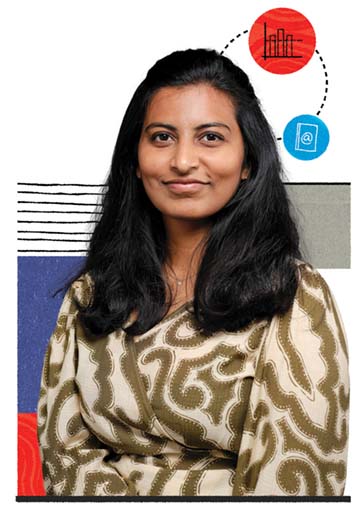
Vibha Bangalore Venkataramu MBA ’24
Women’s Advancement Scholar
I completed an MBA in business analytics at USF in May. Before that, I earned a bachelor’s degree in computer science from Visvesvaraya Technological University and worked as a project manager at General Electric in India.
Why USF? First, the classes are small. For me, it’s important to have that one-on-one interaction with professors, with peers, so I get the opportunity to speak up, discuss, engage, and make lasting relationships. Second, support: A place where you can get help when you need it. It could be academic, financial, moral, or professional. Third, USF coursework is relevant to the current market and to current industries. It’s easy for me to take what I learn and use it in my profession. I don’t want coursework that is just books. I want hands-on experience.
The Women’s Advancement Scholarship helped me buy textbooks, access online learning resources, and attend professional development workshops. But it also provided emotional support. The scholarship means someone is rooting for you, so you feel encouraged: Yeah, I am something. My causes are right, my ambition is right, I’m going in the right direction. I moved 8,000 miles to come to USF. I have big dreams. I want to be a product manager. I want to create products for consumers that can make their lives better. My ultimate goal is to grow strong enough to give back. I look at the incredible women leaders around me and I want to be one of them. Each generation has had more opportunities than the last, but we still have a long way to go. To the USF alumni, I urge you to support a current USF student. You don’t need to return with a lot of money; you can be a mentor or offer an internship. Think back to your own student days. What needs did you have that went unmet? Now is your chance to meet those needs for someone else.
The Women’s Advancement Scholarship supports students pursuing careers in management and leadership who want to shape a more just and humane world, free of gender bias.

